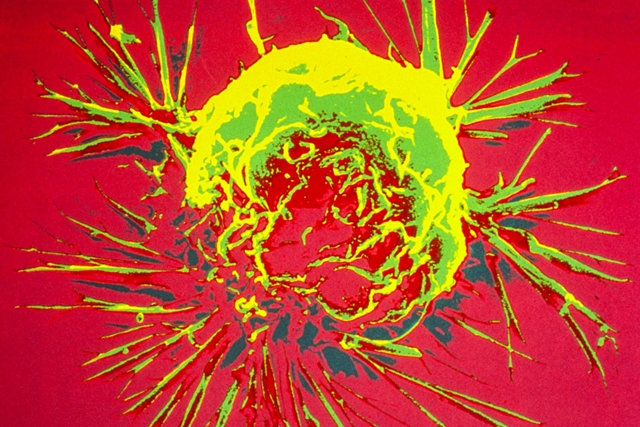
Scanning electron microscope image of a breast cancer cell. (Bruce Wetzel and Harry Schaefer, National Cancer Institute, NIH, Flickr https://flic.kr/p/K4F3ZT)
13 Oct. 2023. Experiences from a rural hospital in North Carolina show hereditary genetic testing of all breast cancer patients is feasible and can result in changes in care for many patients. Researchers from The Outer Banks Hospital in Nags Head, North Carolina and Invitae, a developer of genetic tests and research tools in San Francisco, describe their findings in the 9 Oct. 2023 issue of the journal Annals of Surgical Oncology.
Genetic testing [sponsored link] is one of the tools for tracking the progression of cancer in patients, particularly when the cancer mutates during the course of treatment. For breast cancer patients, however, guidelines for germline or inherited gene testing are murky. The authors describe conflicts between current guidelines for physicians: The National Comprehensive Cancer Network recommends inherited genetic testing of breast cancer patients with the greatest likelihood of harboring disease-causing genetic variants, such as a family history of the disease, while the American Society of Breast Surgeons recommends inherited genetic testing of all breast cancer patients.
For women with breast cancer in rural areas, care is often more difficult to receive. The authors cite data showing less than half of hospitals in upstate New York offer radiation oncology and less than one-third offer breast surgery services. In addition, say the authors, women in rural communities often need to travel further for care, which results in decreased access to radiation therapy and delayed primary therapy. But the authors also note testing for inherited cancer-related genetic changes can provide physicians with better data for decisions on care strategies, such as surgery, radiation, or precision-medicine treatments.
Missed positive tests, if using guidelines
The study team led by Charles Shelton, a radiation oncologist at The Outer Banks Hospital, captured test data and examined medical records from 2019 to 2022, where breast cancer patients at the hospital were eligible for inherited genetic testing as part of their care. Of the 210 eligible patients, 192 or 91 percent, took the test. Participants submitted saliva samples, which in most cases were tested for 47 inherited genes associated with breast and other solid tumor cancers. Participants also received genetic counseling as part of the program. Invitae collected and analyzed the data in the company’s labs, and returned results on average in 14 days.
Results show 25 patients or 13 percent tested positive for cancer-related variants, while 63 percent tested negative, and 24 percent had variants of uncertain significance. And if the National Comprehensive Cancer Network guidelines for inherited genetic testing were used, 15 of the 25 patients testing positive would have received the test, while leaving out the other 10 patients. In addition, 129 or two-thirds of those tested used the results to make adjustments in their treatment, from increased surveillance to additional tests, such as MRIs, to decisions to proceed or suspend further treatments or surgeries.
“Our study provides a blueprint,” says Shelton in an Invitae statement, “for implementing universal hereditary cancer genetic testing in rural populations who typically see disproportionate care due to access to services and treatment.” Shelton adds that the program of inherited genetic testing “did not lead to under- or overuse of radiation therapy or bilateral mastectomy, thus demonstrating that universal testing enables optimization of clinical care and reduces unnecessary health care resource utilization.”
More from Science & Enterprise:
- FDA Clears Genetic Cancer Risk Detection Test
- A.I. Mammogram Screening Shown to Improve Cancer Detection
- Advanced Encryption Shown to Enable Cancer Data Sharing
- DNA Test Detects Early Bladder Cancer in Urine
- A.I. Shown to Enhance Diagnostics in Liquid Biopsies
We designed Science & Enterprise for busy readers including investors, researchers, entrepreneurs, and students. Except for a narrow cookies and privacy strip for first-time visitors, we have no pop-ups blocking the entire page, nor distracting animated GIF graphics. If you want to subscribe for daily email alerts, you can do that here, or find the link in the upper left-hand corner of the desktop page. The site is free, with no paywall. But, of course, donations are gratefully accepted.
Updated 25 May 2024
* * *

 RSS - Posts
RSS - Posts
You must be logged in to post a comment.